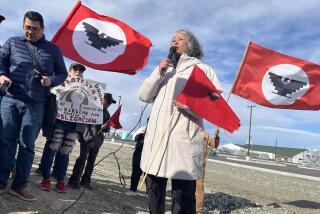Democratic Chairman Asks Neutrality Before Nomination : Labor Urged to Delay ’88 Endorsement
WASHINGTON — Democratic National Chairman Paul G. Kirk Jr. urged the AFL-CIO on Monday to stay neutral in the contest for the 1988 Democratic presidential nomination rather than follow its controversial course of 1984, when the labor federation threw its resources behind the candidacy of the eventual standard-bearer, Walter F. Mondale.
“In my view, the trade union movement can strengthen the party’s nominee by refraining from an early endorsement,” Kirk, who was elected chairman last month with strong union backing, told the annual legislative conference of the Communications Workers of America here.
“Let the candidates use the primary process to develop and to demonstrate their own broad appeal and their own strong political base before giving one your full and united backing,” he added.
The AFL-CIO’s unprecedented endorsement of Mondale in December, 1983, before a single vote had been cast in the presidential primaries, generally was credited with helping the former vice president get the nomination.
However, Colorado Sen. Gary Hart, Mondale’s chief opponent, made an issue of Mondale’s ties to labor. Many Democrats believed that this made Mondale vulnerable to charges of being overly influenced by special interests and contributed to his defeat by President Reagan in November’s general election.
Criticism Rejected
Labor leaders generally have rejected this criticism and say the federation will consider making another endorsement of a contender for the Democratic nomination in 1988.
However, Rex Hardesty, an AFL-CIO spokesman, said Monday that no firm decision has been made. He stressed that the main concern of AFL-CIO President Lane Kirkland is in maintaining a united front, rather than repeating the experience of campaigns before 1984, when various unions supported different candidates.
‘No One Can Know’
Hardesty quoted Kirkland as saying in a recent interview about the possibility of a 1988 endorsement, which would require a two-thirds majority of AFL-CIO unions: “Whether or not it will be possible . . . I don’t know. And no one can know.”
Hardesty said of Kirk’s statement: “We think the chairman is entitled to his opinion.”
In his address, Kirk supported Kirkland’s goal of labor unity in the 1988 campaign. But the chairman added: “I urge you to use that unity not to demonstrate the strength you possess within the Democratic Party, but to help the party reclaim its strength and its rightful political heritage with the American people.”
The communications union’s 1,000 local political and legislative representatives sat silently through Kirk’s comments on the endorsement but applauded him politely at the end of his speech. Later, union President Glenn E. Watts said: “His (Kirk’s) advice will be taken under consideration.”
Whatever the union reaction to Kirk’s views, they will probably get attention elsewhere in the party because Kirk has had a good relationship with the labor movement, first as an aide to Sen. Edward M. Kennedy (D-Mass.) and later during his successful campaign to win the party chairmanship.
Kirk’s speech appeared intended in part to allay concern of some conservative Democrats that he might be obligated to the unions and to demonstrate his independence as party chairman.
More to Read
Get the L.A. Times Politics newsletter
Deeply reported insights into legislation, politics and policy from Sacramento, Washington and beyond. In your inbox three times per week.
You may occasionally receive promotional content from the Los Angeles Times.










